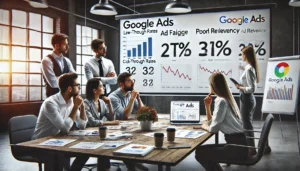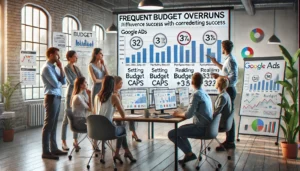Is Your Google Ads Account Costing You Money?

In the ever-evolving world of online advertising, Google Ads is a popular choice for businesses aiming to boost their online presence, drive traffic, and increase conversions. However, even the best-planned campaigns can start to falter. Recognising when your Google Ads account needs a thorough Google ads audit is essential to ensure you’re not wasting your budget.
Key Takeaways
- High costs per click (CPC) with minimal results can signal it’s time for an audit.
- Low click-through rates (CTR) and irrelevant ads indicate poor performance.
- A drop in conversions or conversion rates is a red flag.
- Frequent budget overruns without success suggest inefficiencies.
- Falling ad positions in search results show your ads aren’t competing well.
1. High CPC with Limited Results
When we notice a high cost-per-click (CPC) but see limited results, it’s a clear sign that something is off with our Google Ads account. This situation often means we’re spending more money than necessary without getting the desired outcomes. It’s crucial to address this issue promptly.
One of the first steps we should take is to conduct a thorough PPC audit. This will help us identify any inefficiencies in our campaigns. We might find that our ads are not reaching the right audience or that our keywords are too broad. A detailed audit can reveal these issues and more.
Another important aspect to consider is the relevance of our ads. If our ads are not relevant to the audience we’re targeting, we will likely see high CPCs and low conversion rates. Working with a PPC ad agency can help us refine our targeting and improve ad relevance.
We should also look at our bidding strategy. Sometimes, adjusting our bids can lead to better results without increasing our overall spend. A PPC management team can provide valuable insights into how we can optimise our bids for better performance.
In summary, if we’re experiencing high CPC with limited results, it’s time to take action. Conducting a PPC audit, refining our ad relevance, and optimising our bidding strategy are all steps we can take to improve our campaign performance.

2. Low Click-Through Rates (CTR) and Poor Ad Relevance
A noticeable drop in your click-through rates (CTR) is a clear sign that your PPC campaigns need an audit. CTR is a critical metric that indicates how well your ads are resonating with your audience. If fewer people are clicking on your ads, it could mean that your ad copy is not compelling enough, or your targeting is off.
Consider these potential issues:
- Ad Fatigue: Your audience might be seeing the same ads too often, leading to decreased engagement.
- Poor Ad Relevance: If your ads aren’t relevant to the search queries, users are less likely to click.
- Inadequate Ad Extensions: Utilising ad extensions like sitelinks can significantly boost your CTR. In fact, advertisers can see a 20% increase in click-through rate on average when 4 sitelinks show with their search ads.
3. Decrease in Conversions or Conversion Rates
When we notice a decrease in conversions or conversion rates, it’s a clear sign that something is off in our Google Ads campaigns. This drop can be due to various reasons, and identifying the root cause is crucial for getting back on track.
One common issue is that our ads might not be as relevant to the audience as they once were. This can happen if we haven’t updated our targeting or ad copy in a while. Another reason could be that our landing pages are not providing the expected value, leading to high bounce rates.
To address these issues, we should:
- Review and update our ad copy regularly.
- Ensure our landing pages are optimised for user experience.
- Check if our targeting settings are still aligned with our goals.
It’s vital to monitor these metrics closely. By doing so, we can ensure that our campaigns are as efficient as possible, ultimately leading to better ROI.
4. Frequent Budget Overruns Without Corresponding Success
When we notice our Google Ads budget is frequently being exceeded without seeing a corresponding increase in success, it’s a clear sign that something is off. Overspending without results can be frustrating and costly. We need to streamline our budget to ensure every penny is well spent.
One way to manage this is by setting daily or monthly budget caps. This helps control our spending and prevents budget overruns. Additionally, we should periodically reallocate our budget based on performance trends. This ensures our resources are directed to the most effective areas.
A PPC audit doesn’t just identify wasteful spending; it also helps us allocate our budget more strategically.
We should also identify top-performing campaigns and allocate more budget to them. This allows us to capitalise on their success. By doing this, we can make sure our budget is being used in the best possible way.
5. Drop in Ad Position on Search Engine Results Pages
When we notice a drop in our ad position on search engine results pages, it’s a clear sign that something is off. Ad Rank, which determines where our ad appears, is influenced by several factors. These include our bid amount, the quality of our ad, and the relevance of our keywords. If any of these elements are lacking, our ad position will suffer.
One of the first steps we should take is to review our Quality Score. This score is a measure of how relevant our ad is to the user’s search query. A low Quality Score can drag down our ad position, even if we’re bidding high amounts. Improving our Quality Score can often lead to better ad placement without increasing our budget.
Another important factor is ad fatigue. If our audience sees the same ads too often, they may start to ignore them. This can lead to a decrease in engagement and a drop in ad position. To combat this, we can test responsive search ads. These ads allow us to create multiple headlines and descriptions, which Google will automatically test to find the best-performing combinations.
We should also check our landing pages. If our landing pages are not relevant to the ad or provide a poor user experience, it can negatively impact our ad position. Ensuring that our landing pages are optimised for both relevance and user experience is crucial.
A drop in ad position can be a sign that our Google ads PPC strategy needs a comprehensive audit. By addressing these issues, we can improve our ad performance and get better results from our campaigns.
When your ad position drops on search engine results pages, it can be frustrating and impact your business. But don’t worry, we can help! At PPC Geeks, we specialise in boosting your ad performance and getting you back on top. Our team of experts is ready to provide a free, human review of your ads today. Don’t let your competitors take the lead. Visit our website now and get your free PPC audit.
Conclusion
In conclusion, regularly auditing your Google Ads account is crucial to ensure its optimal performance. By identifying and addressing issues early, you can save money, improve your ad effectiveness, and achieve better results. Remember, even the best campaigns can lose their edge over time. So, keep an eye out for the signs we’ve discussed and don’t hesitate to take action. A well-maintained Google Ads account is key to your business’s online success.
Frequently Asked Questions
What is a Google Ads audit?
A Google Ads audit is a thorough review of your Google Ads account to find areas where you can improve performance and save money.
How often should I audit my Google Ads account?
It’s a good idea to audit your Google Ads account regularly, like every few months, to make sure everything is running smoothly.
What are common signs that my Google Ads account needs an audit?
Common signs include high costs per click (CPC) with few results, low click-through rates (CTR), fewer conversions, frequent budget overruns, and a drop in ad position.
Can I do a Google Ads audit myself?
Yes, you can do a Google Ads audit yourself by following a checklist or guide. However, you might also consider hiring a professional for a more detailed review.
What tools can help with a Google Ads audit?
There are several tools like Google Analytics, Google Ads Editor, and various third-party audit tools that can help you review your account.
How can I lower my CPC in Google Ads?
You can lower your CPC by improving your ad quality, targeting the right keywords, and using negative keywords to avoid irrelevant clicks.
What should I do if my ads are not getting enough clicks?
If your ads are not getting enough clicks, try improving your ad copy, making sure your ads are relevant to your keywords, and using eye-catching visuals.
Why are my Google Ads not converting?
Your Google Ads might not be converting because of poor landing page experience, irrelevant ad copy, or targeting the wrong audience. Reviewing and optimising these areas can help.
Author
Search Blog
Free PPC Audit
Subscribe to our Newsletter
The Voices of Our Success: Your Words, Our Pride
Don't just take our word for it. With over 100+ five-star reviews, we let our work-and our satisfied clients-speak for us.
"We have been working with PPC Geeks for around 6 months and have found Mark and the team to be very impressive. Having worked with a few companies in this and similar sectors, I rate PPC Geeks as the strongest I have come across. They have taken time to understand our business, our market and competitors and supported us to devise a strategy to generate business. I value the expertise Mark and his team provide and trust them to make the best recommendations for the long-term."
~ Just Go, Alasdair Anderson



